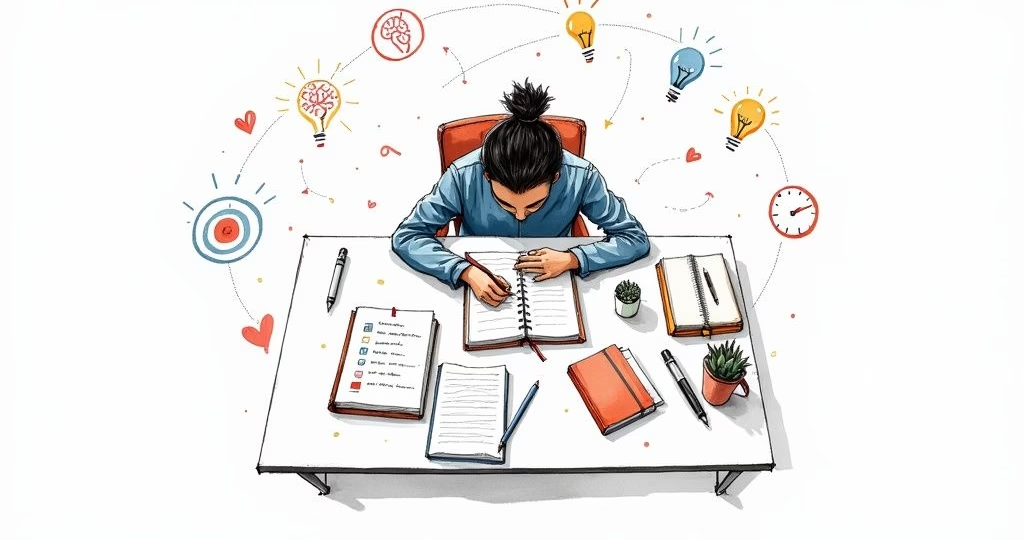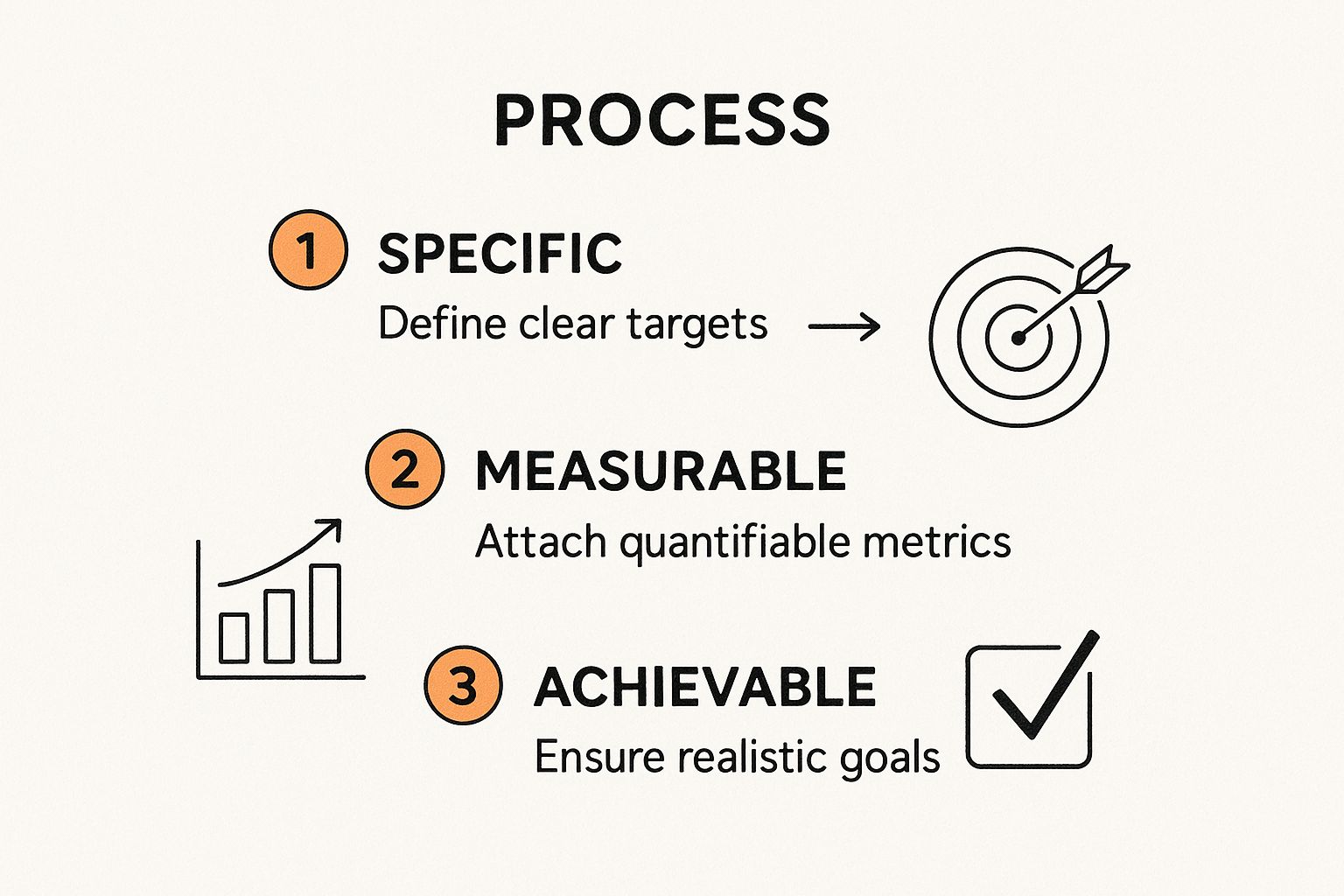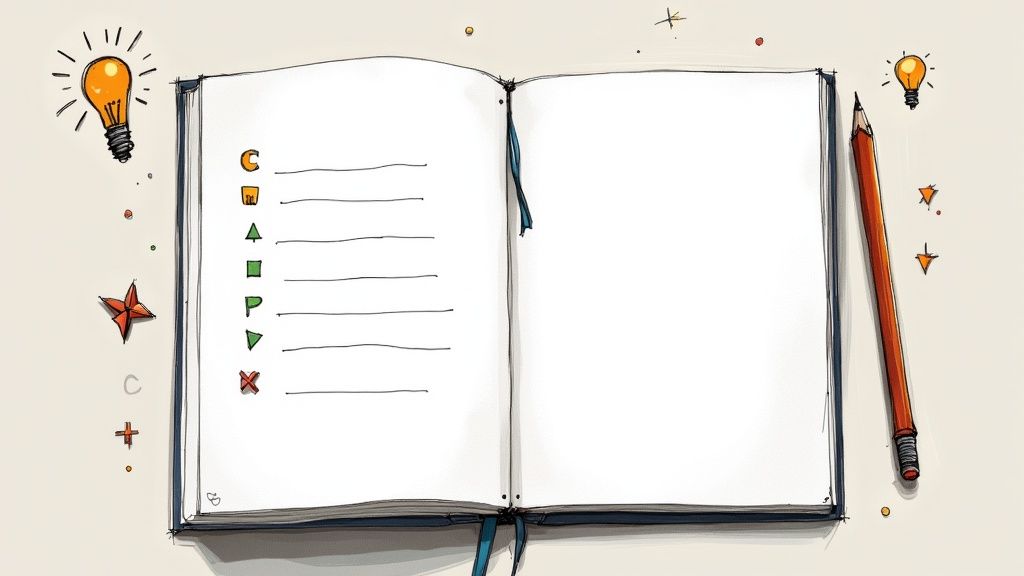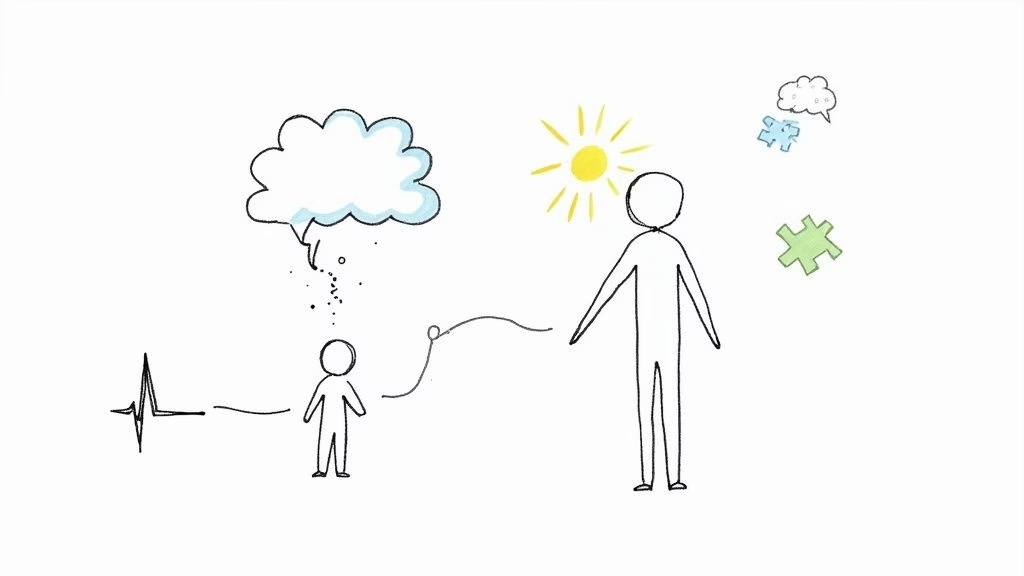
Getting better grades isn't about pulling all-nighters or studying longer. It’s about building a smarter system for success. The real secret comes down to a few key things: figuring out what actually motivates you, mastering study strategies that work with your brain, and learning how to handle school stress without burning out. This guide is your practical, step-by-step roadmap to get it all done.
From Overwhelmed to In Control

I still remember that feeling in my gut—watching my mom's face as she read my report card. Her expression just confirmed what I already knew: my grades were lower than I thought, and it was becoming a real problem. I felt a wave of disappointment, both in myself and for letting her down.
But the conversation we had next wasn't a lecture. It was a question that changed everything: "What if we found someone to help you get set up for success?" She suggested I work with a coach to help me build a better system. My first reaction? No way. I didn't think I needed someone telling me what to do.
Honestly, though, I was exhausted. I was tired of the constant stress, the cycle of putting things off, and the last-minute cramming that barely worked. The idea of having a real plan—a system for success—started to sound less like a chore and more like a lifeline. That conversation was the start of a journey to learn not just how to study harder, but how to study smarter for the long run.
Building Your Personal Success System
This guide is built on everything I learned during that time. It’s packed with the practical, real-world steps that took me from feeling completely overwhelmed to feeling in control of my schoolwork. This isn't about becoming a perfect student overnight. It's about creating a sustainable system that actually works for you.
A lot of students, especially teen boys that are struggling, feel this insane pressure to have it all figured out. When you're struggling in school, it can feel like you're the only one. But academic issues are usually just symptoms of something deeper—like a lack of motivation, messy time management, or just plain-old unaddressed stress.
Tackling these core issues is the only way to unlock lasting academic improvement. It's about building resilience and confidence that go way beyond the classroom.
Here's a quick look at the core pillars we'll cover to transform your study habits and get your grades back on track.
The Smart Study System at a Glance
| Pillar | What It Means | Key Action |
|---|---|---|
| Goal Setting & Motivation | Finding your "why" to fuel your drive. | Set one clear, meaningful academic goal for this semester. |
| Time Management | Taking control of your schedule. | Create a simple weekly schedule that balances school, fun, and rest. |
| Study Techniques | Learning how to study effectively. | Experiment with one new technique, like the Pomodoro Method. |
| Stress Reduction | Managing school pressure without burnout. | Schedule 30 minutes of "unplugged" time each day. |
| Resilience Building | Bouncing back from setbacks. | Identify one small failure and what you learned from it. |
This isn't just about memorizing facts. It's about building a toolkit for a stronger, more confident academic future. We'll get into everything from managing your mental health to finding your focus. For young men who are struggling, we'll also point to helpful resources for young men like men's groups and mentorship programs that offer a solid space for growth. Let's get started.
Build a Foundation with Consistent Study Habits
Let’s be real for a second. The secret to getting better grades isn’t about pulling miserable, caffeine-fueled all-nighters. It's about consistency. Building a solid study routine you can actually stick to—even on days you feel zero motivation—is the real game-changer. This is where you lay the foundation for long-term success without the constant stress.
Think of it like building a house. You can't just toss up some walls and hope it stands. You need a strong, stable foundation first. Consistent study habits are that foundation. They give you the structure to handle tougher subjects, manage a packed schedule, and finally ditch that last-minute panic that always leads to burnout.
Design Your Ideal Study Space
Your environment makes a massive difference in your ability to focus. Studying on your bed might feel cozy, but it usually just tells your brain it's time to relax or sleep, not learn trigonometry. A dedicated, distraction-free zone is non-negotiable if you want to get productive work done.
This doesn't mean you need a fancy home office. It can be a corner of your room, the kitchen table after dinner, or a quiet spot at the local library. The key is making this space exclusively for focused work.
- Keep it clean and organized. A cluttered desk often leads to a cluttered mind. Take two minutes to tidy up before you start.
- Have your supplies ready. Your pens, paper, laptop, and textbooks should all be within arm's reach. No excuses to get up and wander.
- Eliminate digital distractions. Put your phone in another room or use an app to block distracting websites. Seriously, just for a little while.
When you create a dedicated space, you train your brain to flip into "study mode" as soon as you sit down. It makes getting started—and staying focused—so much easier.
Schedule Your Study Blocks
Treat your study time like an appointment you can't break. Instead of just hoping you'll "find time" to study, proactively schedule it into your week using a planner or a digital calendar. This simple shift turns studying from a vague idea into a real commitment.
Research from the Program for International Student Assessment (PISA) shows a clear link between regular study routines and better academic performance. The data reveals that students who put in about 2–3 hours daily for focused study outside of class are more likely to score in the top quartile internationally. This pattern holds true across reading, math, and science, proving that having a strategic plan really does pay off.
This is what it looks like to set clear, actionable study goals.

As you can see, effective goals aren't just vague wishes. They're specific, measurable, and achievable targets that give your study sessions real direction.
Master the Art of Focused Sessions
Here's a truth bomb: hours of unfocused "studying" are way less effective than short bursts of deep concentration. This is where techniques like the Pomodoro Method come in handy. The idea is simple: work in focused 25-minute intervals, then take a 5-minute break. This approach stops you from getting mentally fried and helps you stay engaged with the material.
The goal is not to study longer, but to study smarter. Intense, focused sessions train your brain to absorb information more efficiently, making every minute you spend count.
If you want to level up your organization, you can also explore how Notion can benefit students. Pairing a solid routine with the right digital tools can make a huge difference. By mastering these foundational habits, you’re creating a system that supports your academic goals without the drama.
For a deeper dive into techniques designed for high school, check out our complete guide on essential https://andrewpetrillolifecoaching.com/study-skills-for-high-school-students/.
Win the Battle Against Procrastination and Boost Motivation

Let's be real: procrastination is the ultimate enemy of better grades. It’s that voice whispering, "I'll do it later," which quickly snowballs into a cycle of stress, late-night cramming, and grades that just don’t reflect your true potential. Understanding motivation and school procrastination is key to overcoming this hurdle.
To win this fight, you first have to understand what you’re up against. Procrastination usually isn't about being lazy. It’s a defense mechanism. Research shows it’s an emotional regulation problem, not a time management one. When a task makes us feel anxious, bored, or overwhelmed, our brain's natural response is to avoid it. When a massive project is staring you down, it’s way easier to get lost scrolling through TikTok than to figure out where to even begin.
The trick is to break the cycle with small, deliberate actions that create momentum.
Find Your Personal "Why"
Motivation is the fuel that gets you through the tough stuff, but a vague goal like "get good grades" just won't cut it. To really light a fire, you need to connect your schoolwork to something that actually means something to you.
Take a minute and think bigger. What do you want in the future? Is it getting into a specific college, landing an awesome internship, or learning a skill to build something cool? Your "why" is the personal reason behind all the effort.
- Future engineer? That brutal physics homework is the groundwork for designing the next-gen gaming console or rocket.
- Aspiring artist? Picking apart literature helps you master storytelling, which will make your own creative work that much more powerful.
- Future entrepreneur? That group project you're dreading is a real-world chance to practice leadership and communication—skills you'll need every single day.
When you connect the dots between a boring assignment and a future you’re actually excited about, it stops feeling like a chore. It becomes a stepping stone. Write your "why" down and stick it somewhere you’ll see it every day.
Use Simple Tricks to Just Get Started
The hardest part of any task is starting. It’s true. But once you get going, inertia often takes over and carries you forward. I’ve found two ridiculously simple but powerful techniques that help smash through that initial wall of resistance.
The 5-Minute Rule: Commit to working on that task you’re avoiding for just five minutes. That's it. Tell yourself that when the timer goes off, you can stop if you want. Nine times out of ten, you'll find that getting started was the real hurdle, and you’ll keep going long after those five minutes are up.
Break It Down: A 10-page research paper feels impossible. But writing a single-paragraph outline? Totally manageable. Break those huge projects into the smallest possible steps. Then, just focus on crushing one tiny piece at a time. This creates a chain of small wins that makes the whole thing feel way less intimidating.
If you want to dig deeper, our guide on how to stop procrastinating lays out a full roadmap to get past this common roadblock for good.
Resources for Support and Accountability
Feeling lost, unmotivated, or pressured is completely normal, especially for teen boys who are often told to just "suck it up" and figure it out alone. But you don't have to go it alone. Reaching out for support is a sign of strength, not weakness.
Your mental health is a huge piece of the academic puzzle. When you're struggling emotionally, trying to focus on school can feel impossible. Organizations like The Jed Foundation have fantastic resources for mental health for teens, specifically designed for navigating stress, anxiety, and other challenges. For immediate help, the Boys Town National Hotline offers a 24/7 confidential line.
Accountability is a game-changer. Just telling someone—a friend, a parent, a mentor—about your goals makes you infinitely more likely to follow through.
For young men looking for a community and positive role models, checking out resources for young men can be incredibly powerful. This includes mentorship programs or men's groups like Evryman, which offer structured support and a safe space to talk through challenges, build real confidence, and find a sense of direction. Connecting with others who get it can make all the difference, reminding you that you're not the only one feeling this way and that there's always a path forward.
Master Your Mental Game with Stress Management
Academic pressure is a heavy weight. If you let it pile up without a plan, your grades will eventually pay the price. I've seen it happen time and time again.
Think of your mental health as the foundation for everything else. When that foundation starts to crack under stress, trying to build academic success on top of it becomes nearly impossible. This isn't just about "feeling better"—it’s about building the mental resilience you need to handle tough classes, big exams, and everything in between.
My own wake-up call came when my mom noticed my grades slipping. It wasn't just the bad scores; it was the stress I was carrying around 24/7. Her suggestion to work with a coach wasn't a punishment. It was her way of saying, "Let's get you some tools to handle this pressure so you can actually succeed." That shift in focus from just grades to my overall well-being was a complete game-changer for me.
Taming Stress Before It Takes Over
Constant stress floods your brain with cortisol, a hormone that completely tanks your ability to focus, remember information, and solve problems. You simply can't ace a test if your brain is stuck in fight-or-flight mode.
Learning to manage that stress is one of the most powerful study skills you can develop. Seriously.
A simple yet incredibly effective way to start is with mindfulness meditation. This isn't about emptying your mind or becoming a zen master overnight. It's just about paying attention to the present moment without judging yourself. A few minutes a day can be enough to calm a racing mind before an exam or hit the reset button after a long, draining school day.
A Simple Meditation Guide for Teens
You don’t need a special cushion, incense, or a silent mountain retreat. You can do this right at your desk between study sessions. This simple meditation guide for teens can help you get started.
Here’s a quick guide to get you started:
- Get comfortable. Sit upright in your chair, feet flat on the floor. Let your hands rest in your lap.
- Close your eyes (or don't). If closing your eyes feels weird, just lower your gaze and soften your focus on a spot a few feet in front of you.
- Notice your breath. Don’t try to change it. Just feel the air coming in and out. That's it.
- Let thoughts come and go. Your mind will wander. It’s what minds do. When a thought about homework or what your friend said pops up, just gently notice it and guide your focus back to your breath.
- Start small. Try it for just three minutes. That's all. As you get more comfortable, you can go a little longer.
This simple practice trains your brain to stay focused and calm, which is a massive advantage when you're trying to learn something complex or perform under pressure.
Recognize and Combat Burnout
Burnout is more than just feeling tired. It's a state of complete emotional, physical, and mental exhaustion. It’s what happens when you push yourself way too hard for way too long without hitting the brakes.
Catching the early signs is key:
- Feeling cynical or just constantly negative about school.
- Having zero energy to get assignments done.
- Watching your grades drop even though you're putting in the hours.
- Feeling disconnected from friends or activities you used to enjoy.
The best defense against burnout? Taking strategic breaks. This isn't procrastination; it's a critical part of high performance. Step away from your desk. Stretch, listen to a song, or just stare out the window for a few minutes. Your brain needs that downtime to process information and recharge.
Prioritizing your well-being isn't selfish—it's strategic. A healthy mind is a high-performing mind. The best students aren't the ones who study the most; they're the ones who manage their energy and focus the best.
The data backs this up. Research consistently shows a strong link between well-being and academic achievement. Studies have found that students with higher levels of well-being report greater engagement and better grades. You can learn more about how universities are tracking these educational performance metrics.
Teen Mental Health and Wellness Resource Guide
Especially for teen guys, there's often this unspoken pressure to just "tough it out" and handle everything alone. But reaching out for help isn't a sign of weakness—it's a sign of strength. It shows you're smart enough to use the right tools for the job.
If you're struggling, these resources for mental health for teens are a great place to start. They are designed specifically for teens and young adults.
| Resource | Focus Area | How to Access |
|---|---|---|
| The Jed Foundation | Provides essential support for mental health and suicide prevention for teens and young adults. | Online articles, resources, and a comprehensive help directory. |
| Calm App | Offers a wide range of tools for stress reduction, including guided meditations and sleep stories. | Available as a mobile app for both iOS and Android devices. |
| Boys Town National Hotline | A free, confidential resource providing 24/7 crisis support for teens and their families. | Accessible via a phone hotline and a live online chat service. |
| Man Therapy | Presents mental health tools and information in an engaging format tailored for men and boys. | An interactive website with practical tools and valuable information. |
Remember, your mental game is just as important as your study habits. By actively managing stress, taking care of your mind, and knowing where to turn for support, you're not just aiming for better grades—you're building a foundation for success that will last a lifetime.
A Parent's Guide to Supporting Your Teen

As a parent, you're in a unique and powerful position to help your teen succeed. But it's a tricky balance, isn't it? You want to be a supportive coach, not an overbearing manager. These parenting tips are designed to help you create an environment where they feel confident enough to own their success themselves.
I remember my own journey toward better grades started with a simple conversation with my mom. After a particularly bad report card, she didn't get angry or ground me. Instead, she suggested we find a coach who could help me build a better system for success. Her approach wasn't about her fixing my grades; it was about giving me the tools to fix them myself. That support changed everything.
Shift the Conversation From Grades to Growth
One of the most powerful changes you can make is to stop focusing on the outcome and start paying attention to the effort. Instead of asking, "What's your grade in History?" try something like, "What was the most interesting thing you learned in History today?"
This small tweak completely transforms the dynamic. It tells your teen you value learning, curiosity, and hard work more than just a letter on a report card. This takes the pressure off and encourages them to engage with school on a deeper level—which, funny enough, almost always leads to better grades. To explore more on this, check out these coaching tools for enhancing teen engagement in school.
Create a Supportive Home Environment
Your home is the backdrop for your teen's entire academic life. You don't need a complete overhaul to make it work for them, just a few thoughtful adjustments.
- Designate a Study Zone: Work with your teen to set up a clean, quiet, and well-lit space for homework. Having a specific spot helps their brain flip the switch into "focus mode."
- Set Tech Boundaries (Together): Technology is the ultimate distraction. Collaborate on some reasonable rules for screen time during study hours. Maybe phones stay in another room until assignments are done.
- Prioritize Health and Wellness: Make sure they're getting enough sleep, eating decent meals, and have time for physical activity. A rested, healthy brain is a high-performing brain.
These small things create a stable foundation, removing the common roadblocks so your teen can actually concentrate on their work.
Be a Listener First and a Problem-Solver Second
When your teen comes to you with a struggle—a tough subject, a problem with a teacher, social stress—your first instinct might be to jump in with solutions. Resist that urge. More often than not, what they really need is a safe space to vent without being judged.
Practice active listening. Just let them get it all out before you offer a single piece of advice. Sometimes, just saying the problem out loud is enough for them to figure out their own solution. When they feel heard and understood, they’ll be far more open to your guidance when you do offer it.
Your role is to be their biggest cheerleader and a reliable sounding board. By offering unconditional support, you empower them to face challenges head-on, building the resilience they need to succeed both in and out of the classroom.
For teen boys that are struggling, who often feel societal pressure to handle everything on their own, creating this safe space is absolutely critical. If you notice your son is withdrawn or his motivation for school is low, it might be a sign that he needs support beyond what you can offer at home. Resources for young men, such as specialized men's groups or mentorship programs, can provide an invaluable outlet.
These communities offer a space where teen boys can talk about their challenges openly with peers and mentors who get what they're going through. This can be a powerful supplement to your support, helping them build confidence and find a new sense of purpose. By combining a supportive home with the right external resources, you help your teen build a full support system for long-term success.
Common Questions About Improving Your Grades
Even with a solid plan, you're going to have questions. It's totally normal. Here are some of the most common ones I hear from students and parents, with clear, no-fluff answers you can actually use.
How Long Does It Actually Take to See Better Grades?
This is probably the number one question I get. Everyone wants to know the timeline. While there's no magic number, you can often see small but real improvements within just a few weeks of consistent effort. These are the early wins—like better quiz scores or feeling more confident speaking up in class.
But significant changes on your report card? Those usually take a bit longer. Give it a full grading period, which is typically around six to nine weeks, to see a real shift. The way I see it, improving your study habits is like building a muscle. It requires time and regular practice to get stronger.
The key is to focus on the process, not just the results. When you commit to better organization, less procrastination, and more active studying, the better grades will naturally follow.
As you start putting in this work, remember that it’s all building toward your future. Your academic efforts are the foundation for your career, and understanding how to frame those achievements can be a huge motivator. Looking at well-crafted Curriculum Vitae examples for students is a great way to see how it all connects down the road.
What if I Have a Learning Disability Like ADHD or Dyslexia?
First off, the strategies in this guide are designed to help every student, especially the ones on time management, breaking down tasks, and cutting down on stress.
However, if you have a diagnosed learning disability like ADHD or dyslexia, it’s critical to pair these techniques with professional support. Think of this guide as your general toolkit and your personalized support plan (like an IEP or 504 Plan) as your specialized equipment. When you use them together, you create a powerful system for success.
Your first step should be talking with a school counselor, a teacher you trust, or your parents about getting an official evaluation if you don't have one. This can unlock crucial accommodations like extended time on tests, access to assistive tech, or specialized learning tools.
These accommodations aren't a crutch. They are tools designed to level the playing field so you can actually show what you know.
How Can I Help My Son Who Shows No Motivation for School?
For a lot of teen boys, what looks like a lack of motivation isn't about being lazy. It often comes from feeling disconnected from the material, completely overwhelmed by the pressure, or just not seeing the point of it all. My own story started right here—my mom realized my issue wasn't a lack of ability, but a need for a better system and some real, tangible motivation.
Instead of hammering on about grades, which can feel abstract and just add more stress, try connecting his schoolwork to something he genuinely cares about.
- Loves video games? Talk about the complex storytelling, the coding that makes it work, or the business strategy behind a successful launch.
- Into sports? Connect math to player stats or physics to the perfect jump shot.
- Enjoys building things? Link that passion to the engineering or design principles he's learning in science class.
This approach reframes school from a list of chores into a set of tools he can use to get better at what he already enjoys.
Beyond school, it’s vital to build his confidence in other areas of his life. Explore resources designed specifically for young men who are struggling to find their footing. This could include:
- Mentorship Programs: Connecting with a positive adult role model can provide guidance and a different kind of accountability.
- Men's Groups: Organizations like men's groups and other youth initiatives give boys a safe space to talk about their challenges and build self-esteem.
When a young man feels successful and confident in one part of his life, that feeling often spills over into his schoolwork. The goal is to build him up as a whole person, not just as a student.
At Andrew Petrillo Life Coaching, we specialize in helping teens and young men build the systems they need to thrive. If you're ready to move from overwhelmed to in control, let's connect. Book a complimentary discovery call to see how one-on-one coaching can unlock your potential at https://andrewpetrillolifecoaching.com.
RELATED POSTS
View all



